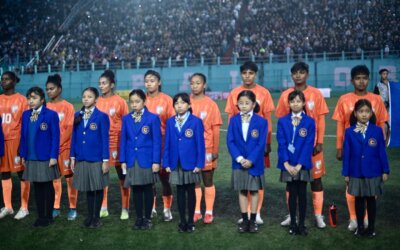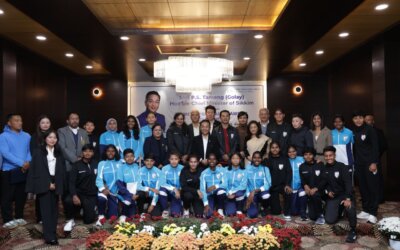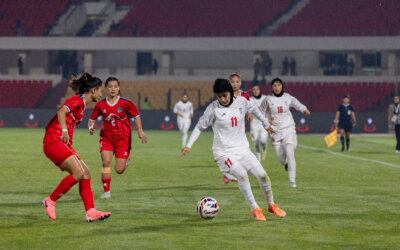By Soumo Ghosh,
AIFF Media Team
NEW DELHI: The India girls are all set to kick off their SAFF U-18 Women’s Championship, as they prepare for their opening Group A fixture against hosts Bhutan on Friday at the Changlimithang Stadium in Thimphu.
The girls, who have had a few weeks to build their team chemistry at the National Institute of Sports in Patiala, will now be playing under a new gaffer, who has had plenty of experience on the domestic circuit, both as a player and a coach.
Alex Ambrose, who hails from Goa, has played for some of the top clubs in the country, like Dempo, Vasco and Mumbai FC. The former striker then went on to earn some valuable coaching experience in the Indian Super League (ISL), where he was a long-term assistant coach at Mumbai City FC under some of the top names in world football, like former Manchester City and Sunderland manager Peter Reid, ex-Arsenal and Chelsea star Nicolas Anelka, and former Costa Rica and Panama head coach Alexander Guimaraes.
Having taken over as the head coach of the India U-18 Women’s team, Ambrose is now set for his first ever tournament as a national team gaffer as he leads his girls out onto the pitch in Bhutan. AIFF Media caught up with the former National Football League winner with Dempo (2004/05 season) ahead of his first match in charge of the young eves.
Here are some excerpts from our conversation with him.
This is the first time you will be in charge of a national team dugout. Looking forward to the new experience?
It’s a proud moment for me. Like every coach, I too feel proud to be a part of the national team. But the key difference between coaching at a club or at a national team is developing. I’m really happy to see the rich talent that our country has in women’s football. Given good opportunities and exposure, these girls could really develop into top players in the future.
How different do you find, coaching a national team, to that at a club?
At clubs, it’s all about getting the results. But in a national team, the main focus is development. You are not just worried about winning.
Since there is so much emphasis on results at clubs, the pressure is pretty high. But as for national teams, where development is at the forefront of every other objective, that is not the case. Developing a team takes time, so you get more opportunity to get settled, and let the players get settled to the environment, and study different aspects of the team and its players.
How different do you find coaching in women’s and men’s football?
There is a gap between men’s and women’s football, but then it wouldn’t be fair to compare the two. They are completely different from each other, so for me, comparing the two too much is not the right thing to do.
The type of leagues that they have, it would be very unfair to compare the two. The more exposure and opportunities they (women) get, gradually we can come to the point where we can compare men’s and women’s football in India.
For me personally, my girls have shown exceptional commitment. Their learning curve has been amazing. They have made it a learning process for me also.
As a coach, I have also had to adapt to their >
How do you think we can improve women’s football in India?
There’s a lot that we can do to improve women’s football in India. Firstly, we need tournaments across all age-groups for the girls. I believe, right now, the AIFF is doing that. They are taking women’s football very seriously, and they are trying to push the clubs to promote the women players.
The federation is organising more leagues for the women players so that they can get more opportunities and more exposure. Winning or losing shouldn’t matter as much. Right now, what we need is to organise more tournaments to give more exposure to the players. When they feel exposed, they can really push themselves and explore their own talents in a deeper manner.
Plus, they can go back to their native cities, towns or villages and become ambassadors for the sport in that area. That will inspire more girls to take up football, and then we can truly grow.
You have been an assistant coach under some top managers like Peter Reid, Nicolas Anelka, and Alexander Guimaraes. What learnings will you bring onto the plate for the U-18 girls?
To be fair, there is not much difference in terms of football tactics. That is something that’s more or less universal these days, as you can study matches from all over the world these days anyway. Top coaches like Anelka or Guimaraes were given a lot of luxuries at the clubs. You cannot always have such luxuries like signing top foreign players for your club.
But what I truly learned from them, more than coaching, is managing. There are always different types of characters in a dressing room – something that’s true both for men’s and women’s football.
I’ve worked with Guimaraes, Anelka and even with Peter Reid in my first season at Mumbai City FC, and the most important thing that I have learned from these guys is how to manage players.
Anybody can coach. But the ability to manage a set of players is what sets you apart. You have to be special to do that. And how the players react to different situations, both on and off the pitch, depends on how the coach manages them.


 Shop
Shop






